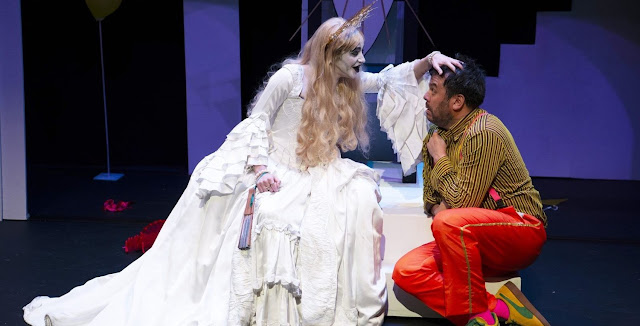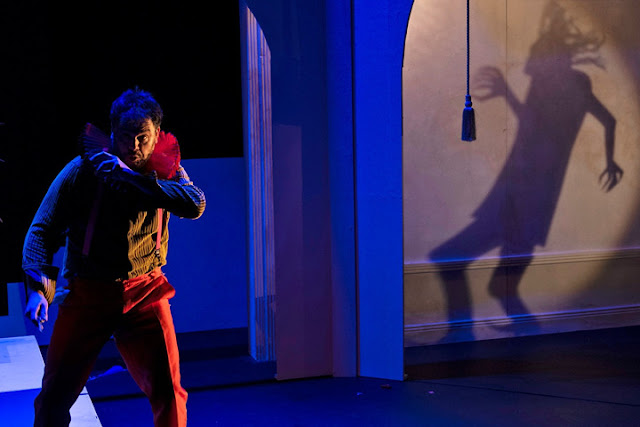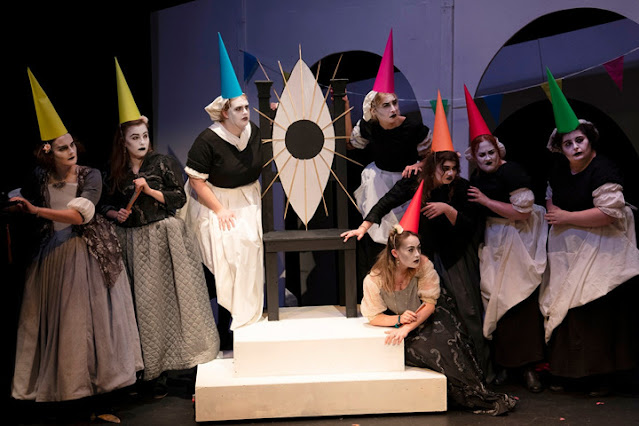 |
| Zemlinsky: The Dwarf (Der Zwerg) – Eleri Gwilym, Charne Rocheford Wexford Festival Opera (Photo: Pádraig Grant) |
Zemlinsky: The Dwarf (Der Zwerg); Eleri Gwilym, Charne Rocheford, Charlotte Baker, Ross Cumming, director Chris Moran, music director Christopher Knopp; Wexford Festival Opera at the Jerome Hynes Theatre
Reviewed 31 October 2025
A scaled-down version of Zemlinsky’s drama that retained the work’s intensity and vividly held our attention with a title role who really wrenched the heart.
In 1900, Alexander von Zemlinsky met and fell in love with Alma Schindler, one of his composition students. She reciprocated his feelings initially; however, Alma felt a great deal of pressure from close friends and family to end the relationship. They seem to have been concerned with Zemlinsky’s lack of an international reputation and by an unappealing physical appearance. She broke off the relationship and subsequently married Gustav Mahler in 1902. The episode inspired Zemlinsky’s orchestral fantasy Die Seejungfrau, completed in 1903. In 1907, Zemlinsky married but the marriage was an unhappy one.
This seems to be the background to Zemlinsky’s decision to write his opera Der Zwerg with a libretto loosely based on Oscar Wilde’s short story, The Birthday of the Infanta. Commentators suggest that Zemlinsky may have felt some sort of identification with the title role in the opera. Whilst it is easy to project the opera’s leading characters onto Zemlinsky and Alma Schindler, this can also feel like lazy hindsight.
 |
| Zemlinsky: The Dwarf (Der Zwerg) – Charne Rocheford Wexford Festival Opera (Photo: Pádraig Grant) |
Zemlinsky’s The Dwarf, sung in an English translation by Viktor Jugovic was one of the Pocket Operas presented by the Wexford Festival Opera this year. I caught the final performance on 31 October 2025 at the Jerome Hynes Theatre, the studio theatre at the National Opera House in Wexford. The production was directed by Chris Moran with designs by Lisa Krugel. Charne Rochford played the Dwarf with the remaining cast members drawn from the Wexford Festival Chorus. Eleri Gwilym as Donna Clara, the Infanta, Charlotte Baker as Ghita, Ross Cumming as Don Estoban, the chamberlain, Victoria Harley, Olivia Carrell and Erin Fflur as maids, and Cerys MacAllister, Heather Sammon, Eleanor O’Driscoll and Camilla Seal as friends of the Infanta. Music director Christopher Knopp accompanied on the piano.
Zemlinsky scored the opera for large orchestra – triple woodwind, horns, trumpets, trombones and tuba, plus significant percussion. Hearing it on the piano, intrepidly played by Christopher Knopp, meant that the work could be given on a more intimate scale and with voices who would not necessarily be able to scale the heights of Zemlinsky’s full orchestration. Knopp played musically, though you were aware that he faced a near impossible task. Another fascination from hearing it without the orchestration was finding out how close to Richard Strauss’ Salome the work seemed. Strauss wrote his Oscar Wilde-based work in 1905 with the Austrian premiere taking place in 1906 in Graz, an event that had Arnold Schoenberg, Giacomo Puccini, Alban Berg, and Gustav Mahler in the audience.
Moran and Krugel seemed to be taking German Expressionist cinema as their inspiration. Costumes and sets were black and white with very stylised makeup particularly for the women. The set was simply arches which had a hint of De Chirico to them. Above the set was a screen on which were projected intermittent titles in the manner of a silent film.
Ross Cumming (who impressed in the title role of Vaughan William’s The Pilgrim’s Progress with British Youth Opera in 2023, see my review) made a strong impression as Don Esteban, and his scenes with the maids and Ghita – Victoria Harley, Olivia Carrell, Erin Fflur and Charlotte Baker – had a nice vividness to them with all concerned projecting the sheer intensity and anxiety of serving the Infanta. The four friends of the Infanta – Cerys MacAllister, Heather Sammon, Eleanor O’Driscoll and Camilla Seal were similarly well done. And all the scenes where the two principals were absent had a strength and vivacity to them which ensured that the drama did not flag. It was unfortunate that Charlotte Baker’s costume as Ghita was rather close to that of the maids, but Baker did wonderfully establish her nervously sympathetic character.
With her stylised period dress and extreme make-up, Eleri Gwilym cut a dramatic figure as the Infanta. And Gwilym definitely had a nice line in demanding imperiousness, though her voice is perhaps rather light for the role with orchestra [she was the Queen of the Night in Charles Court Opera’s production of The Magic Flute earlier this year, see my review]. One of the Infanta’s gifts was a tiara and wearing this on her throne there was something wonderfully Madonna-like to Gwilym’s portrayal, yet with the strong black and white make-up that almost made her the reverse of a Madonna.
The handling of the dwarf was sympathetically done. Charne Rocheford was not forced to emulate dwarfism. Instead, he was dressed in a clothes of alarmingly vivid and clashing colours, in complete contrast to the stylised black and white of the court. On his first entry and at other times, notably when he looked in the mirror, we saw projected a cut-out puppet suggesting the character’s real appearance.
This hardly mattered because Rocheford’s performance was so vividly engaged. His voice had a thrilling, high-tension element to it which seemed to set the character apart and physically he was a nice combination of anxious and self-absorbed with a sense of a little boy lost faced with the elaborate court ritual. There was a real difference to this character as opposed to the rest of the court. Rocheford did not so much elicit our sympathy as wrench it from us and he held us in the palm of his hand throughout. The final scenes leading to his death had a wonderful tension to them.
 |
| Zemlinsky: The Dwarf (Der Zwerg) – Wexford Festival Opera (Photo: Pádraig Grant) |
Zemlinsky’s Der Zwerg is a demanding work and the cast all rose to the challenge superbly, creating a performance that gripped for the whole of its 80 or so minutes. Whilst the production probably would not be capable of being scale up to using the full orchestration, at least not with all of these voices, doing a repeat with a small instrumental ensemble would surely be beneficial.
The blog is free, but I’d be delighted if you were to show your appreciation by buying me a coffee.
Elsewhere on this blog
- Vivid presence & engagement: Peter Whelan & Irish Baroque Orchestra in Bach’s Mass in B minor at Christ Church Cathedral, Dublin – concert review
- Il viaggio a Reims: members of the Wexford Factory dazzle in Rossini’s occasional showpiece despite moving the action to an asylum – opera review
- Deidamia: a welcome chance to catch Handel’s final Italian opera in Wexford, though the production feels a little self-indulgent – review
- Different musical accents: Le Trouvère, Verdi’s French revision of Il trovatore receives a rare outing in Wexford – opera review
- There was no closure here: four Irish women composers give voice to women of the Magdalene Laundries in Oxford – concert review
- Lyric beauty & great storytelling: tenor Hugo Brady & pianist Mark Rogers in Moore’s Melodies at Oxford International Song Festival – concert review
- Baba Yaga: Songs and Dances of Death: Rowan Hellier pushes boundaries with music theatre exploring a figure from Slavic folklore – review
- Focus on Shostakovich: tenor Oliver Johnston’s fearlessness & speaker Philip Ross Bullock in engaging form in Oxford – concert review
- Valentin Berlinsky: marking the centenary of founder and cellist of the Borodin String Quartet – concert review
- Home








